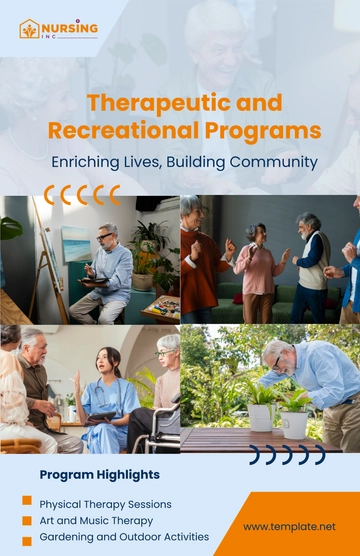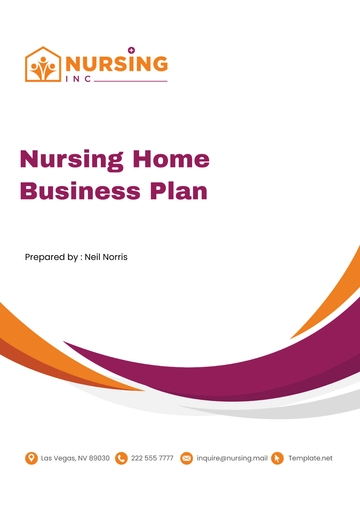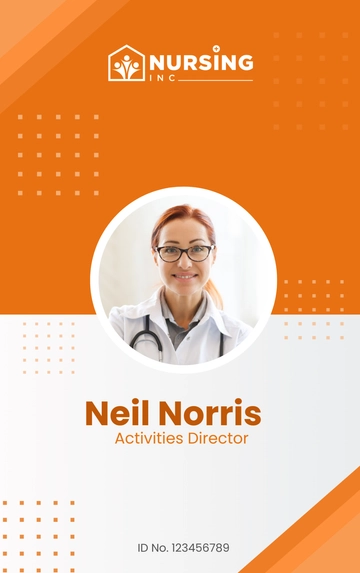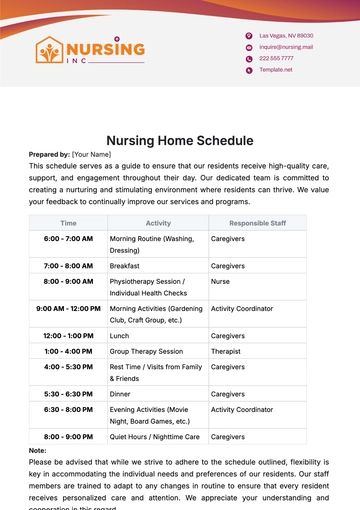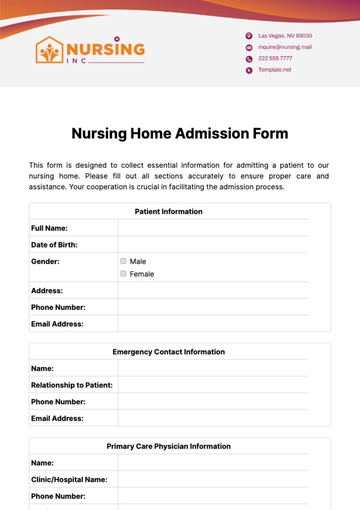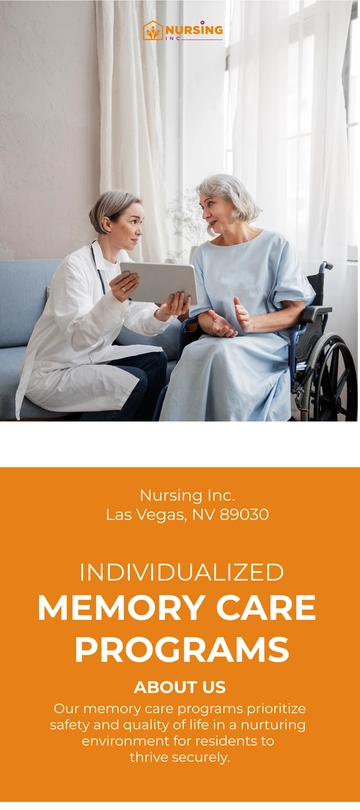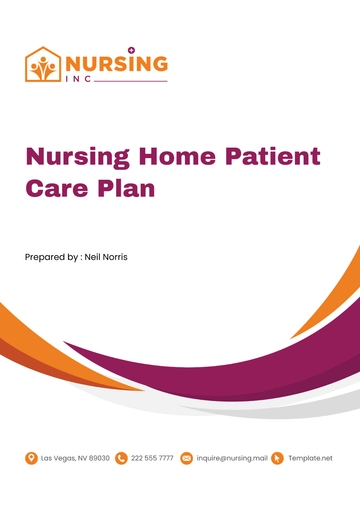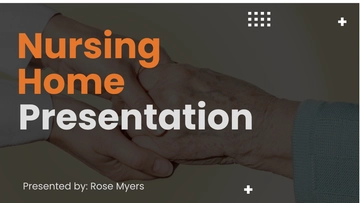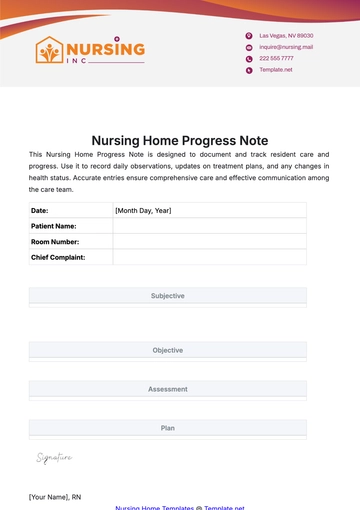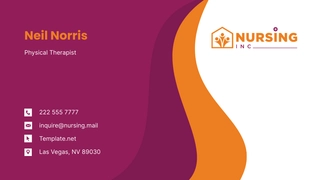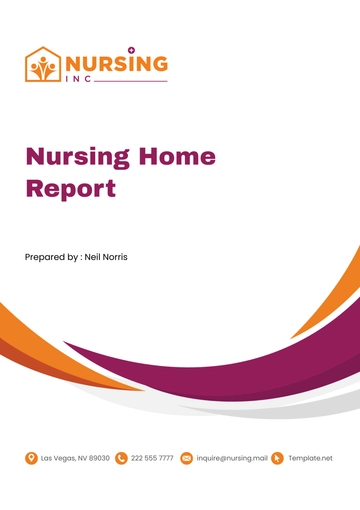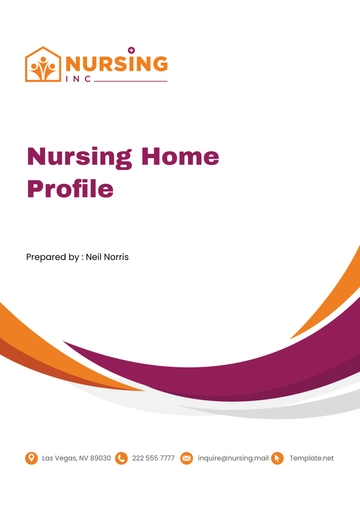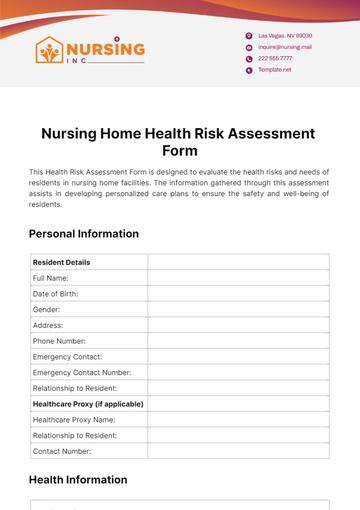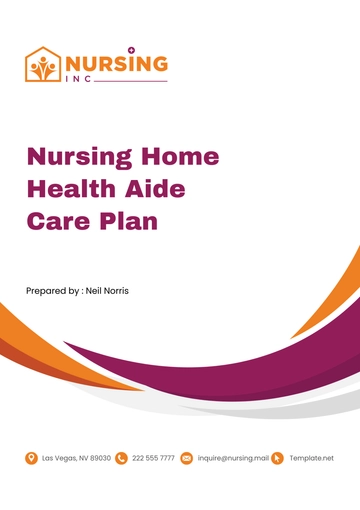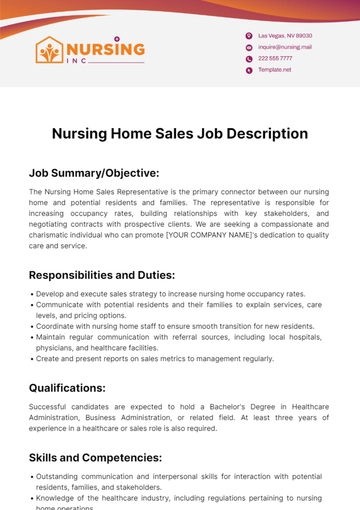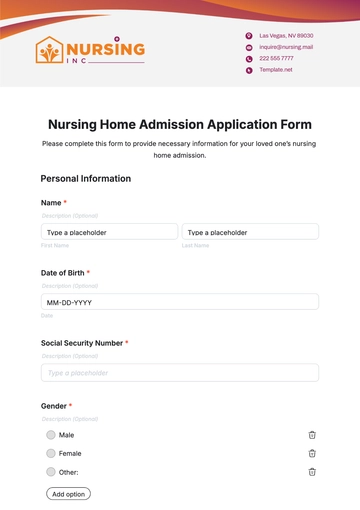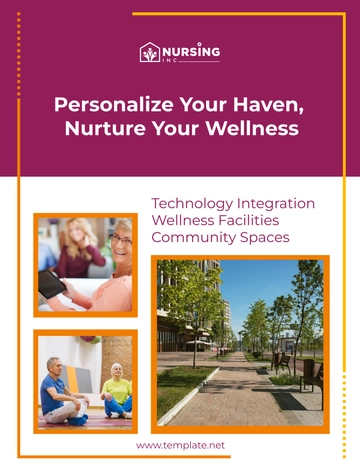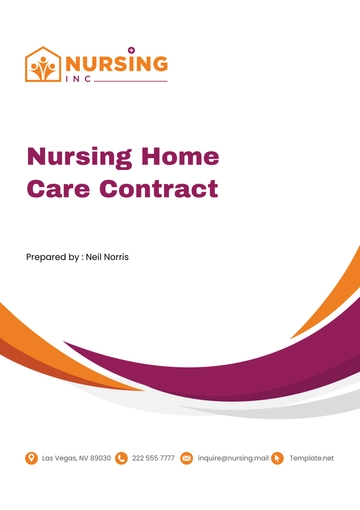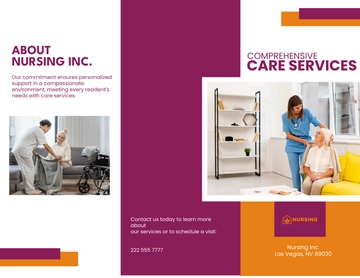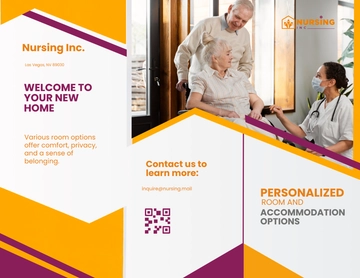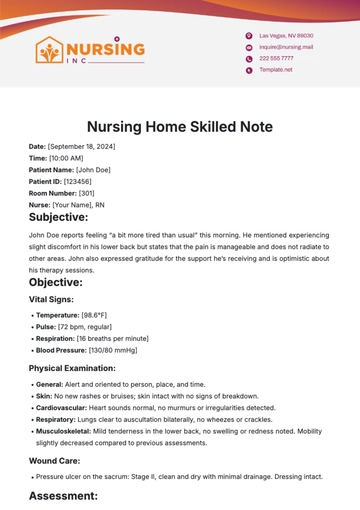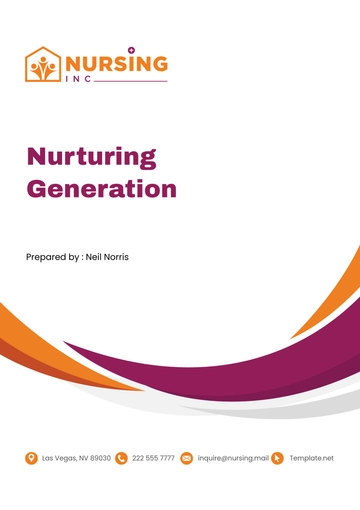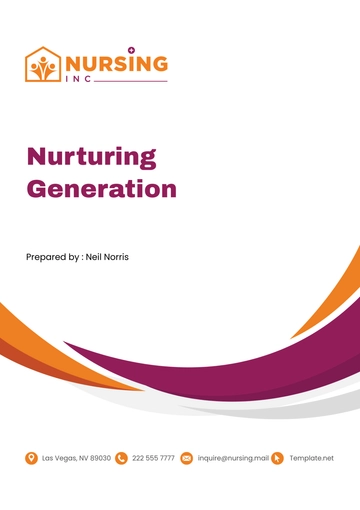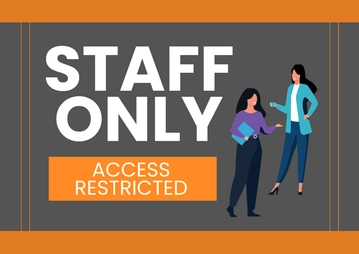Free Nursing Home Management Policy
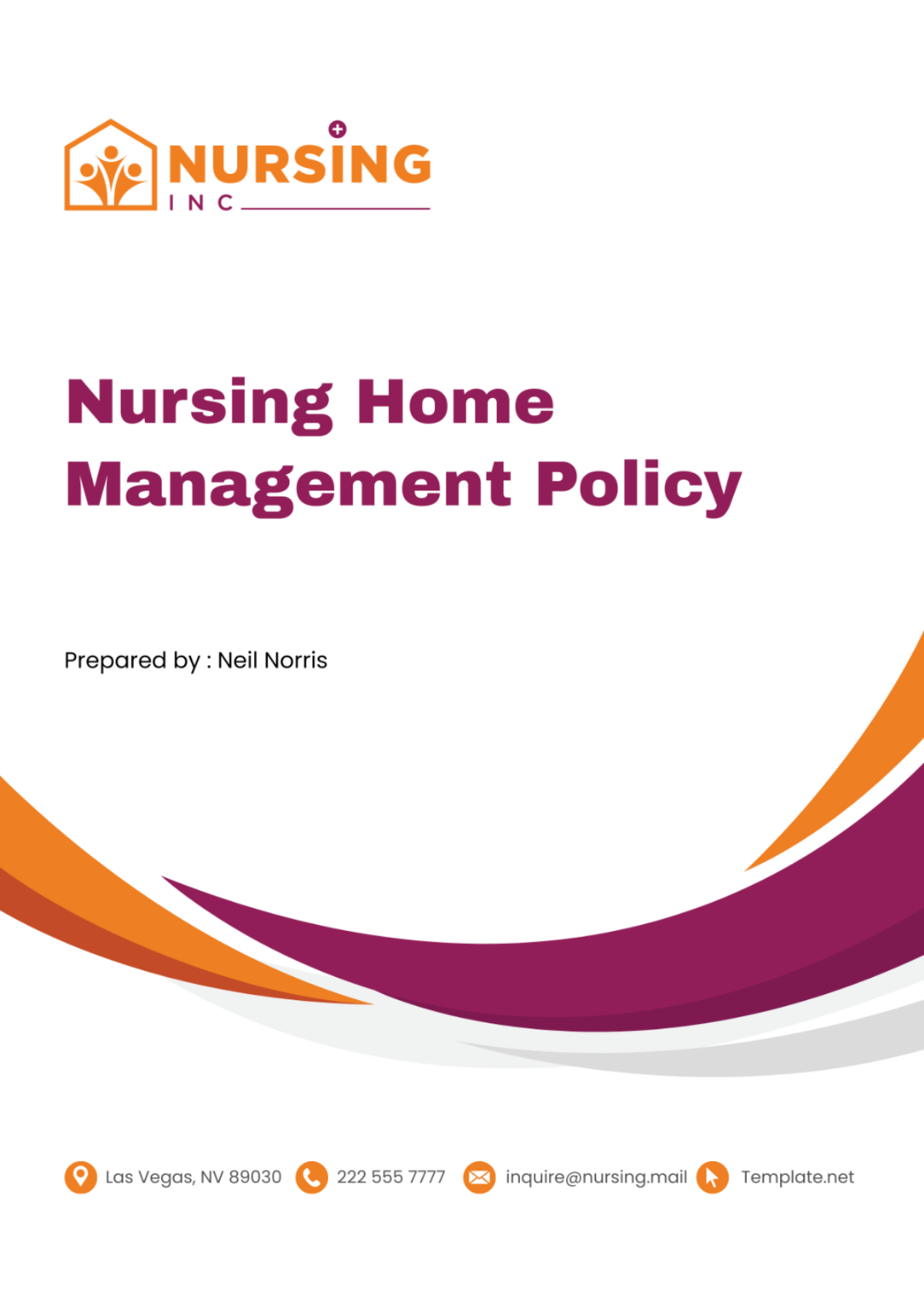
1. Objective
The primary objective of the Nursing Home Management Policy is to establish a rigorous framework that ensures the delivery of exceptional care and services to our residents. This policy is designed to guide [Your Company Name] in fostering a safe, respectful, and dignified environment for both residents and staff. By setting clear expectations for operational excellence, compliance with legal and ethical standards, and continuous improvement practices, we commit to upholding the highest levels of care quality, resident satisfaction, and staff professionalism. Our dedication to these principles is foundational in our pursuit to be a leader in the nursing home industry, making [Your Company Name] synonymous with trust, compassion, and excellence in care.
Resident-Centered Care
At the heart of our Nursing Home Management Policy lies our commitment to resident-centered care. This approach ensures that all care plans and activities are tailored to meet the individual needs and preferences of each resident, promoting their autonomy, dignity, and comfort. Our staff undergoes rigorous training and ongoing education to remain adept at addressing the holistic needs of our residents, encompassing physical, emotional, social, and spiritual well-being. [Your Company Name]'s philosophy emphasizes compassionate care, personalized interactions, and active family involvement, fostering a nurturing environment where residents feel valued and heard.
Quality Assurance and Compliance
[Your Company Name] is dedicated to maintaining the highest standards of quality and compliance in all aspects of our operations. Our Quality Assurance program is rigorously designed to monitor, evaluate, and enhance the care and services provided, ensuring they meet or exceed industry standards and regulatory requirements. Regular internal audits, resident satisfaction surveys, and performance reviews are integral components of our compliance strategy, enabling us to identify areas for improvement and implement corrective actions promptly. This steadfast commitment to excellence safeguards our residents' health and safety while reinforcing our reputation as a premier nursing home provider.
Staff Development and Well-being
Recognizing that our staff is the cornerstone of providing exceptional care, [Your Company Name] invests heavily in staff development and well-being. Our comprehensive training programs are tailored to equip our team with the knowledge and skills necessary to meet the diverse needs of our residents. Additionally, we foster a supportive work environment that values work-life balance, professional growth, and mental health. By prioritizing the well-being of our staff, we ensure they are motivated, engaged, and capable of delivering the compassionate care our residents deserve. Through recognition programs and feedback mechanisms, we celebrate our staff's achievements and encourage their active participation in enhancing our care delivery model.
2. Leadership Roles and Responsibilities
The Nursing Home Management Policy meticulously delineates the roles and responsibilities of leadership positions within [Your Company Name], emphasizing accountability, excellence, and a culture of continuous improvement. Leadership at all levels is crucial for setting the tone and direction of our care and operational standards. Herein, we outline the specific duties associated with key managerial roles.
2.1 Executive Management
Executive Management, including the CEO and CFO, bears the ultimate responsibility for the strategic direction and financial health of [Your Company Name]. They ensure resources are appropriately allocated to meet the nursing home’s goals, uphold ethical standards, and maintain compliance with regulatory bodies. Their leadership in fostering a culture of quality, respect, and integrity is paramount in guiding the organization towards achieving its mission.
2.2 Nursing Home Administrator
The Nursing Home Administrator acts as the linchpin in daily operations, coordinating all aspects of resident care, facility management, and staff oversight. They are responsible for implementing the policies set forth by Executive Management, ensuring the delivery of high-quality care, and maintaining operational efficiency. This role also involves direct communication with residents and their families, addressing concerns, and promoting satisfaction with the services provided.
2.3 Director of Nursing
The Director of Nursing oversees the nursing staff and the delivery of all nursing services. This role is critical in ensuring that care standards are not only met but exceeded. Responsibilities include staff scheduling, overseeing patient care plans, managing the nursing budget, and ensuring compliance with health and safety regulations. The Director of Nursing also plays a key role in staff development, fostering a supportive and educational environment for nurses at all levels.
2.4 Quality Assurance Manager
The Quality Assurance Manager is tasked with developing, implementing, and monitoring the quality assurance and improvement program. They conduct regular audits, analyze resident care and satisfaction data, and work closely with department heads to address deficiencies. Their role is vital in ensuring that [Your Company Name] adheres to the highest standards of care and compliance, promoting ongoing improvement in service delivery.
2.5 Human Resources Manager
The Human Resources Manager is responsible for recruiting, hiring, and training staff, ensuring that [Your Company Name] attracts and retains high-quality personnel. This includes managing staff certifications, conducting performance evaluations, and developing incentive programs. They also handle employee relations and create policies that support a healthy workplace culture.
2.6 Resident Care Coordinator
The Resident Care Coordinator focuses on individual resident care, acting as a liaison between residents, their families, and the healthcare team. They ensure care plans are personalized and up-to-date, advocate for resident needs, and coordinate with external healthcare providers. Their role is essential in ensuring resident satisfaction and promoting a holistic approach to care.
2.7 Facilities Manager
The Facilities Manager oversees the physical environment of the nursing home, ensuring it is safe, secure, and conducive to the well-being of residents and staff. Responsibilities include managing maintenance staff, overseeing repairs, and ensuring compliance with safety standards. They also play a key role in emergency preparedness and the implementation of sustainability practices within the facility.
These leadership roles are foundational to the effective management and operation of [Your Company Name], ensuring we provide a high standard of care to our residents while fostering a positive work environment for our staff.
3. Financial Management
This section of the Nursing Home Management Policy outlines the key principles and practices necessary to ensure the sustainable operation of [Your Company Name]. Through meticulous financial planning, rigorous cost control, regular audits, and strict compliance with financial legislation and regulations, we aim to uphold our commitment to excellence and integrity in all financial matters. Here we detail the components crucial to effective financial management within our facilities.
3.1 Annual Budget Planning
Annual Budget Planning is the cornerstone of our financial management system, ensuring that [Your Company Name] operates within its means while still providing high-quality care. This process involves forecasting revenue streams and estimating expenditures for the upcoming fiscal year, with input from all department heads to accurately reflect operational needs and objectives. The budget plan supports strategic decision-making, aligns financial resources with our care goals, and sets financial performance targets. Regular reviews are conducted to adjust for unforeseen expenses or changes in our operating environment, ensuring agility in financial planning.
3.2 Cost Control Measures
Implementing effective Cost Control Measures is essential to maintaining financial health and ensuring resources are utilized efficiently. [Your Company Name] adopts a proactive approach to managing costs, identifying areas where expenses can be reduced without compromising the quality of care. This includes negotiating with suppliers for better rates, investing in energy-efficient technologies, and adopting lean management practices across all departments. By continuously monitoring expenses and comparing actual costs against budgeted amounts, we can identify discrepancies early and implement corrective actions, thus safeguarding our financial stability.
3.3 Financial Audits
Financial Audits are conducted regularly to assess and verify the accuracy of our financial records, ensuring transparency and compliance with accounting standards and regulatory requirements. [Your Company Name] engages independent auditors to perform annual audits, providing an objective review of our financial statements and internal control systems. These audits help identify potential areas of risk, inefficiencies, or non-compliance, offering an opportunity for continuous improvement in our financial practices. Audit findings are reported to Executive Management and the Board of Directors, forming the basis for enhancing financial governance and accountability.
3.4 Compliance with Financial Legislation and Regulations
Adherence to Financial Legislation and Regulations is paramount in the operation of [Your Company Name]. Our policy mandates strict compliance with all applicable financial laws, including tax obligations, healthcare funding regulations, and financial reporting standards. The Finance Department stays abreast of changes in financial legislation and implements necessary adjustments to our policies and practices. This commitment to legal and regulatory compliance not only safeguards our operation from financial penalties and legal issues but also reinforces our reputation as a trustworthy and reliable care provider.
Through these structured financial management practices, [Your Company Name] ensures the responsible stewardship of resources, supporting our mission to deliver outstanding care while maintaining financial sustainability and integrity.
4. Staff Training Procedures
[Your Company Name] places a high value on the continuous professional development of our staff, recognizing that a skilled and knowledgeable workforce is essential for delivering the highest quality of care to our residents. This section is designed to ensure that all team members, from clinical staff to administrative personnel, receive comprehensive and ongoing training. This training aligns with industry best practices and equips our staff with the latest skills and knowledge necessary for excellence in healthcare service delivery. Here are the key components of our approach to staff training and development.
4.1 Orientation Program
The Orientation Program introduces new employees to the culture, values, and operational procedures of [Your Company Name]. This foundational training covers workplace safety, resident privacy rights, infection control, and emergency response procedures. The goal is to ensure that all staff members start with a solid understanding of our expectations and their role in providing exceptional care.
4.2 Professional Development Plans
Each staff member at [Your Company Name] has a personalized Professional Development Plan (PDP) designed to identify and track their career goals, skills enhancement opportunities, and training needs. PDPs are developed in collaboration with direct supervisors and are reviewed annually to adjust goals and identify achievements. This personalized approach encourages staff engagement, satisfaction, and professional growth.
4.3 Mandatory Training Modules
Mandatory Training Modules are established to ensure that all staff meet the required regulatory and compliance standards. These modules include, but are not limited to, patient handling, privacy and confidentiality, infection control, and safety protocols. Staff are required to complete these modules upon hire and on an ongoing basis, as determined by regulatory updates or organizational needs.
4.4 Specialized Clinical Training
For clinical staff, Specialized Clinical Training sessions are conducted to deepen their expertise in specific areas of care, such as wound care, dementia support, and palliative care. These sessions are led by experts in the field and include both theoretical knowledge and practical application, ensuring our clinical team is equipped to meet the diverse needs of our residents.
4.5 Leadership and Management Training
Recognizing the importance of strong leadership, [Your Company Name] offers Leadership and Management Training for current and aspiring leaders within our organization. This training covers effective communication, team management, conflict resolution, and strategic planning. It is designed to build the skills necessary for leading high-performing teams and fostering a positive organizational culture.
4.6 Continuous Education and Certification
To support Continuous Education and Certification, [Your Company Name] provides access to external workshops, seminars, and courses relevant to our staff's roles and professional interests. We encourage and often sponsor certification programs that are recognized industry-wide, reinforcing our commitment to maintaining a highly qualified workforce.
4.7 Performance Feedback and Training Evaluation
The effectiveness of our Staff Training Procedures is regularly assessed through Performance Feedback and Training Evaluation processes. Staff performance reviews, coupled with training feedback surveys, inform the ongoing development and refinement of our training programs. This ensures our training remains relevant, effective, and aligned with the evolving needs of our residents and the healthcare industry.
By implementing these comprehensive Staff Training Procedures, [Your Company Name] ensures that our team remains at the forefront of healthcare service excellence, fully equipped to deliver compassionate, high-quality care to all residents.
5. Resident Care Protocols
[Your Company Name] is committed to delivering exceptional care to our residents, focusing on their physical, emotional, and social well-being. Our Resident Care Protocols are meticulously designed to ensure comprehensive, personalized, and consistent care from the moment of admission through the entire duration of stay. These protocols guide our staff in delivering the highest standards of care, tailored to meet the unique needs of each resident. Below, we detail the critical components of our approach to resident care.
5.1 Admission Process
The Admission Process is the first step in our care journey, designed to be welcoming and informative for both the resident and their family. Upon admission, [Your Company Name]'s staff conducts an initial assessment to understand the resident's medical history, preferences, and care needs. This process includes a review of previous medical records, a physical examination, and discussions with the resident and their family. The goal is to ensure a smooth transition into our care facility, providing reassurance and clarity on the care plan and services available.
5.2 Comprehensive Assessment
Following admission, a more Comprehensive Assessment is undertaken to develop a detailed understanding of the resident's health status, capabilities, and needs. This multidisciplinary assessment involves nursing, therapy, nutrition, and social services teams and is critical for formulating an individualized care plan. Regular reassessments are scheduled to adjust care plans according to the changing needs and preferences of the resident, ensuring that care remains person-centered and responsive.
5.3 Individualized Care Planning
The cornerstone of our resident care is the Individualized Care Planning process. Based on the comprehensive assessment, a personalized care plan is developed, outlining specific care requirements, goals, and preferences. This plan is reviewed and updated regularly in consultation with the resident and their family, ensuring it adapts to the resident's evolving needs. The care plan guides all staff involved in the resident's care, fostering a coordinated and holistic approach to their health and well-being.
5.4 Medical Support and Services
[Your Company Name] provides a full spectrum of Medical Support and Services to meet the healthcare needs of our residents. This includes routine medical care, emergency response, medication management, rehabilitation services, and access to specialists as needed. Our on-site medical team is equipped to handle a wide range of health issues, ensuring timely and effective treatment. We also emphasize preventive care and health promotion activities to support our residents' overall well-being.
5.5 Monitoring and Quality Improvement
Ongoing Monitoring and Quality Improvement efforts are essential to our commitment to high-quality care. [Your Company Name] employs various tools and metrics to monitor care quality, resident satisfaction, and adherence to care plans. Feedback from residents and their families is actively sought and used to inform continuous improvement initiatives. Regular staff training, care audits, and review meetings ensure that our care practices meet the highest standards and are aligned with best practices in elder care.
By adhering to these Resident Care Protocols, [Your Company Name] ensures that each resident receives compassionate, comprehensive, and high-quality care tailored to their specific needs and preferences, upholding our pledge to excellence in resident welfare.
6. Compliance with Industry Standards and Regulatory Requirements
[Your Company Name] is steadfast in its commitment to upholding the highest standards of integrity and trust across all facets of our operations. Our adherence to industry standards and regulatory requirements is not merely about legal compliance; it's about earning and maintaining the trust of our residents, their families, and our staff. This comprehensive commitment ensures excellence in resident care, financial management, staff training, and facility operations. Below, we outline the key areas of our compliance strategy, ensuring that [Your Company Name] not only meets but strives to exceed the expectations set forth by industry regulators and standards bodies.
6.1 Resident Care Compliance
In the realm of Resident Care Compliance, [Your Company Name] follows stringent protocols to ensure that all care delivered aligns with the best practices and guidelines established by healthcare authorities. This includes adherence to standards for patient safety, quality of care, medication management, and resident rights. Regular training programs keep our staff up-to-date on the latest care practices, ensuring our residents receive the best possible support tailored to their individual needs.
6.2 Financial Integrity and Transparency
[Your Company Name] maintains the highest levels of Financial Integrity and Transparency, abiding by all applicable financial reporting standards, tax laws, and healthcare funding regulations. Our comprehensive financial management system includes regular audits, both internal and external, to ensure accuracy and compliance with financial legislation. This rigorous approach guarantees that we manage resources responsibly, prioritizing the welfare of our residents and the sustainability of our operations.
6.3 Staff Training and Certification
Ensuring that our team is fully trained and certified is a cornerstone of our commitment to compliance. [Your Company Name] mandates that all staff undergo regular training to meet the requirements set by regulatory bodies for healthcare providers. This includes ongoing education in patient care, emergency preparedness, privacy and data protection, and workplace safety. By investing in the continuous professional development of our staff, we ensure that our team is competent, confident, and capable of delivering high-quality care.
6.4 Facility Standards and Safety
Our dedication to compliance extends to the physical environment of our nursing home. [Your Company Name] rigorously adheres to Facility Standards and Safety regulations, including those related to building codes, accessibility, fire safety, and environmental health. Regular inspections and maintenance ensure that our facilities are not only safe but also welcoming and comfortable for our residents, fostering a living environment that they can truly call home.
6.5 Legal and Ethical Standards
Above all, [Your Company Name] is committed to upholding the highest Legal and Ethical Standards in every aspect of our operation. This encompasses our interactions with residents and their families, our business practices, and our engagement with the community. We have established policies and procedures to address any ethical concerns promptly and transparently, ensuring that we operate with integrity at all times.
By rigorously adhering to these compliance areas, [Your Company Name] ensures a foundation of trust, safety, and excellence. Our proactive approach to compliance not only meets the requirements set forth by industry standards and regulatory bodies but also reinforces our dedication to providing exceptional care and service to our residents and their families.
7. Continual Improvement and Accountability
[Your Company Name] shall perpetually aim at enhancing its care delivery whilst upholding the principles of accountability. We promote an open culture, where feedback from residents, their families, and staff members, is valued and used to improve our services.
For any more information or queries, feel free to contact us at [Your Company Email] or call us at [Your Company Number]. This policy has been instituted by [Your Company Name] and is subject to review and modification at our discretion.
Date of Issue: [Month Day, Year]
[Your Company Name]
[Your Company Address]
Email: [Your Company Email]
Phone: [Your Company Number]
- 100% Customizable, free editor
- Access 1 Million+ Templates, photo’s & graphics
- Download or share as a template
- Click and replace photos, graphics, text, backgrounds
- Resize, crop, AI write & more
- Access advanced editor
Template.net introduces the Nursing Home Management Policy Template, fully editable in our Ai Editor Tool. A dynamic resource for the healthcare field, offering detailed, customizable guidance for smooth operations management. This template will eliminate inconsistencies, ensure compliance, and foster excellence in service. Explore the potential of an industry-standard template that can adapt to your unique needs.
